Anthony Grassroots Prize
The Anthony Grassroots Environmental Prize was established in 1999 by environmental activist Juliette Anthony. Every year, the Prize recognizes an outstanding example of grassroots environmental activism in California with public recognition and a $1,000 cash award.
Our 20 years of Anthony Grassroots Prize winners include Comité Progreso de Lamont, Theresa Harlan, Marily Woodhouse, Winnemem Wintu Tribal Chief Caleen Sisk, Chris Hwang, Regina Chichizola, and so many more.
Congratulations to Comité Progreso de Lamont for winning the 2023 Anthony Grassroots Prize for grassroots environmental activism!
Fund Details
Annual Prize:
$1000.00
Important Dates:
Check back here for updates on when submissions to the 2024 Anthony Grassroots Prize will open.
Let’s Connect:
Have questions about the Anthony Grassroots Prize? Contact us grants@rosefdn.org

Eligibility and Nomination Process
The Anthony Prize is a $1,000 cash award recognizing outstanding achievement in the field of grassroots environmental activism during the previous year. Either individuals or small organizations are eligible for nomination, and the Prize is oriented toward recognizing outstanding personal or volunteer-based achievement in conservation and environmental justice, rather than professionally-based environmentalism. Self-nominations are accepted. If an individual is the winner, they can designate the environmental grassroots organization that they want to receive the prize money. (Please note: The prize money must be awarded to an organization, not an individual.)
- Either individuals or organizations may be nominated.
- Organizational Nominees: The annual budget must be below $100,000/yr.
- Individual Nominees: must be a volunteer.
- Geographic Area: California only. Activities may be local, regional, or statewide in scope.
Required materials include:
- A 2 page (1,000 word) letter describing the nominee and reasons for nomination.
- Two references including phone numbers or email addresses.
- Up to 2 pieces of additional background material such as press clips, flyers, or a newsletter will also be accepted, but are not required.
- Contact information (address, phone number, and email) for the both nominee and the nominator.
Prize Winners
Meet some of the prize winners over the past 20 years.
-
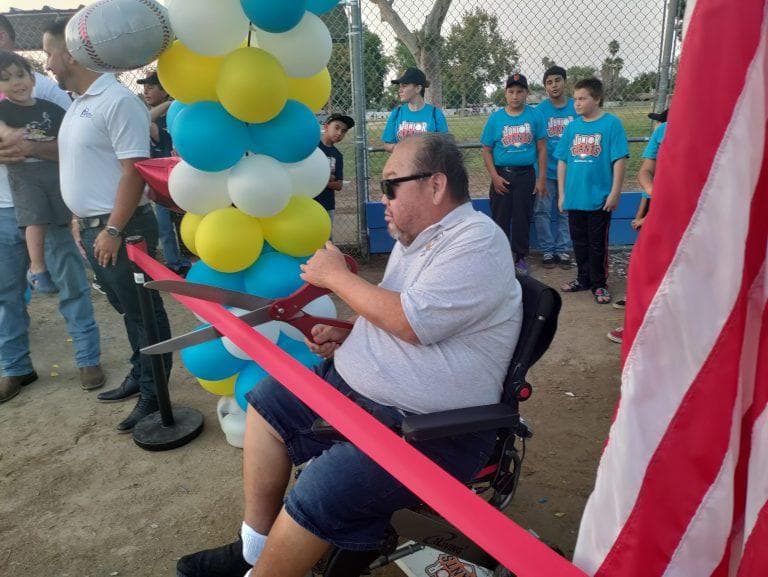
Comité Progreso de Lamont
2023 Anthony Prize Winner
Tucked between the mountains and farmlands at the southern end of California’s Central Valley sits the unincorporated town of Lamont. In the United States, unincorporated areas do not have a municipal government. This means that residents often face greater challenges to receiving funding and resources for public improvements because they quite literally cannot call City Hall for help. Add in a legacy of discrimination and active disinvestment in farmworker communities like Lamont and the result is a community facing the brunt of environmental impacts like poor air quality, pesticide exposure, and flooding.
Anthony Prize winner, Comité Progreso de Lamont (CPL) is returning power to Lamont, campaigning in place of local government for community improvement projects. The volunteer-led group’s mission is to achieve a healthy environment and to improve the quality of life for Lamont residents by building a collective community voice to advocate for change. Since its inception, CPL has fought for and won numerous community improvement projects and protections for residents. In total, the group has helped secure over $125 million in funding to improve infrastructure, water, and air quality in Lamont. They’ve engaged in advocacy on oil and gas drilling regulations, affordable housing, and sidewalk and street repairs.
-
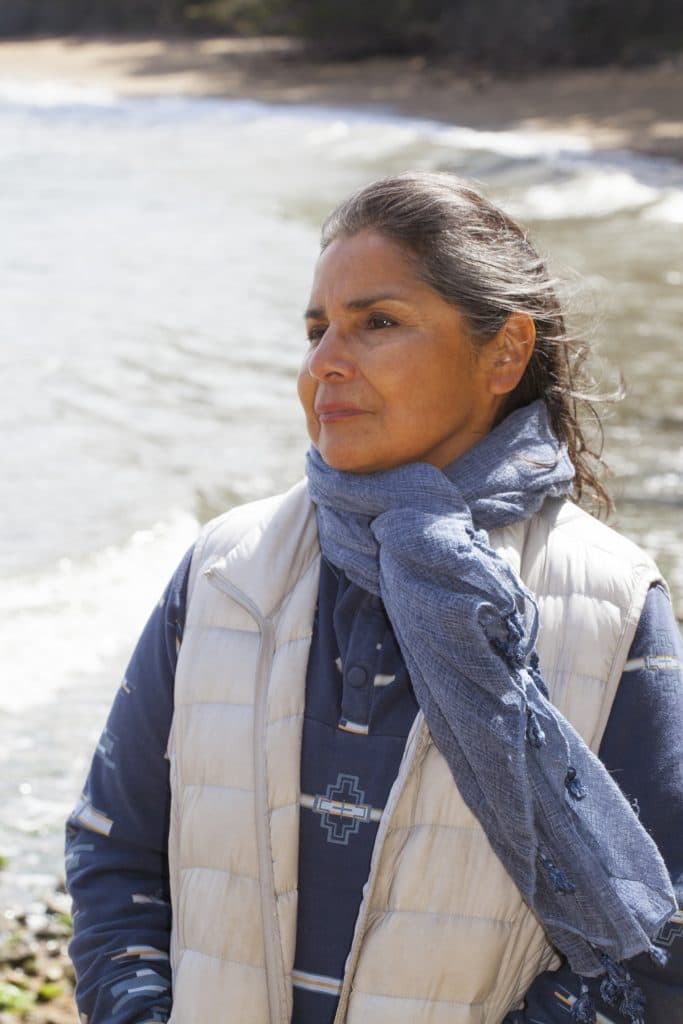
Theresa Harlan, Founder and Executive Director of the Alliance for Felix Cove
2022 Anthony Prize Winner
In 2021, Theresa launched the Alliance for Felix Cove to restore and represent the history, culture, and ecological wisdom of the Coast Miwok at their ancestral homeland in Point Reyes National Seashore. The organization takes its name from the ancestral homesite of the last Tomalko family to live on the western shores of Tomales Bay. Theresa’s immediate goal is to establish the cove as a historical district at Point Reyes, with a living history center and garden for Indigenous history and traditional ecological knowledge. But she sees her work as part of a much broader movement. “All across the Americas, Native peoples are leading the shift toward re-affirming ancestral relationships with public lands and honoring the sacred.” Theresa explains.
Theresa hopes her work at Point Reyes will inspire other Native Peoples to do the same at public lands in California and across the country. “The land is calling us, and I’m trying to bring Native people, relatives, children, and grandchildren back to this place to heal,” Theresa explains. “I am truly honored to be selected for this award dedicated to protecting and restoring our earth, our mother and all our relatives in nature. To be in the company of past recipients fortifies our work to honor our beloved ancestors and heal the separation from our family’s home. We do this work so that future generations will know the resilient legacy of past generations and continue the Indigenous cultural and ecological practices of Tamalko people, people of Tamal-liwa (Tomales Bay).”
-

Marily Woodhouse, Director of Battle Creek Alliance
2021 Anthony Prize Winner
Since launching Battle Creek Alliance nearly 15 years ago, Marily has held the State of California, Sierra Pacific Industries, and other large timber companies accountable to environmental laws which protect people and planet. Her work to protect forests, watersheds, and wildlife not only supports local ecosystems, but also aims to address fire prevention and build climate resilience. With painstaking care and extreme scientific rigor, Marily has developed and led a citizen science initiative which has collected over 14,000 water and habitat quality samples to document the damage of industrial clearcut logging throughout the Battle Creek Watershed. These efforts have led her to Superior Court, where this Earth Day, she will formally open the arguments for a sweeping public challenge of the State of California’s pattern and practice of routinely ignoring the requirements of CEQA and the Forest Practice Act and the cumulative impacts of this destructive clearcut logging on the watershed.
Her outreach and education to broaden community knowledge, promote resource conservation, and protect the Battle Creek Watershed led her to produce Clearcut Nation, a feature-length film.
-

Winnemem Wintu Tribal Chief and Spiritual Leader Caleen Sisk
2019 Anthony Prize Winner
The Winnemem Wintu tribe is indigenous to Northern California and has been formally recognized by the California Native American Heritage Commission, an agency of the State of California with responsibility for preserving and protecting Native American sites and cultural resources in California. We once numbered approximately 14,000; by 1910, after several decades of conflict with white settlers, that number had plummeted to 400. Today the tribe’s population is approximately 150.
In our language Winnemem Wintu translates to Middle Water People as the McCloud River is bounded by the Upper Sacramento to the West and the Pit River to the East. We were born from water, we are of the water, and we fight to protect it.
Since assuming leadership in 2000, Chief Sisk has focused on uplifting the cultural and religious traditions of the Winnemem Wintu Tribe, such as the revitalization of the Winnemem’s H’up Chonas (War Dance) and BaLas Chonas (Puberty Ceremony). In tandem, she advocates tirelessly for salmon restoration, the undamming of watersheds, and the basic human right to clean water. Chief Sisk is currently leading the Tribe’s resistance against the proposal to raise the Shasta Dam, and is an integral voice in the efforts to bring salmon home to the tribe’s sacred watersheds above the dam.
-
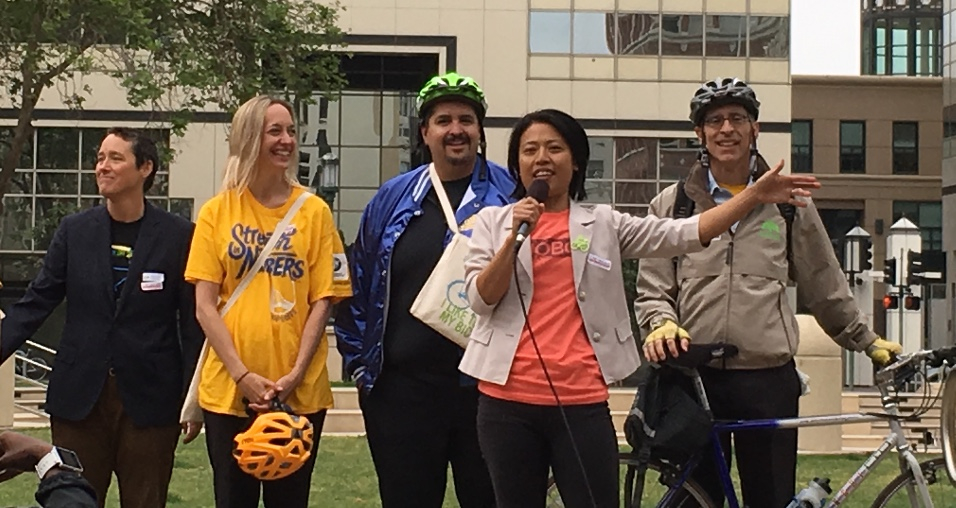
Bicycle Champion Christine Hwang
2018 Anthony Prize Winner
Chris Hwang is a tireless advocate for biking and walking. As the chair of Walk Oakland Bike Oakland, she has played a catalytic role in the development of this highly effective, volunteer-led organization that strives to improve neighborhood quality of life by making biking and walking easy, safe, and enjoyable for all Oakland residents. “Walk Oakland Bike Oakland has benefited from the critical support of the Rose Foundation, as have many grassroots advocacy groups. It is a tremendous honor to receive the Anthony Prize. This award is a reflection of the passion and desire for change of WOBO supporters and neighborhood leaders, upon whose trust and ideas I rely on to advocate for vibrant, livable, and sustainable communities. I thank the Foundation for recognizing our collective dreams,” said Chris.
The 2018 Anthony Grassroots Prize recognizes Chris Hwang’s enthusiastic leadership in helping Oakland become a modern, healthy, and livable city. “Look at the human and economic costs of gasoline,” explains Juliette Anthony, a lifelong environmental activist and Chair of the Anthony Prize Selection Committee, “Chris is leading us to a better future. We need more people like her!” Rose Foundation Executive Director Tim Little adds, “Throughout California, we suffer from poor air quality and dangerous streets due to heavy automobile traffic. We salute Chris’ work to place Oakland at the forefront of an active transportation revolution which benefits everyone who walks, bikes, or breathes.”
-
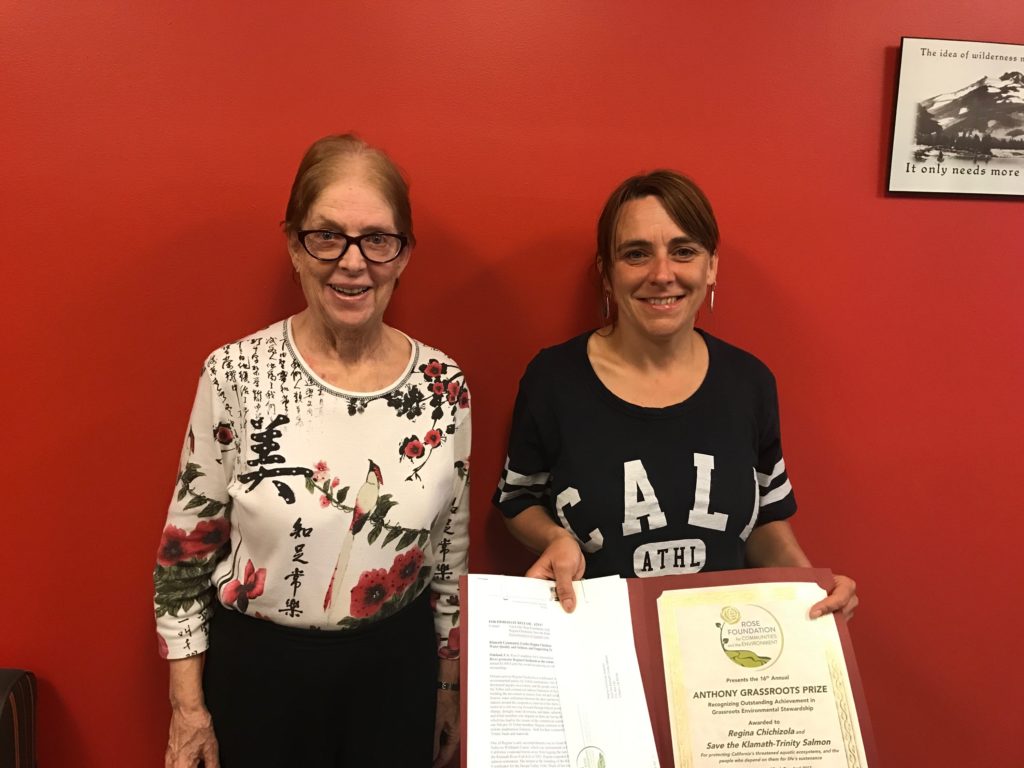
Regina Chichizola
2017 Anthony Prize Winner
Orleans activist Regina Chichizola is a dedicated volunteer advocate for wild salmon and environmental justice for Tribal communities. She focuses her passion towards protecting California’s threatened aquatic ecosystems, and the people who depend on them for life’s sustenance, especially the Tribes and commercial salmon fishermen of the Klamath-Trinity basin. She was an early leader in building the movement to remove four old and outdated dams from the Klamath River, which led to a historic water settlement between the dam operators, state and federal government, and some tribal nations around the cooperative removal of the dams.
-
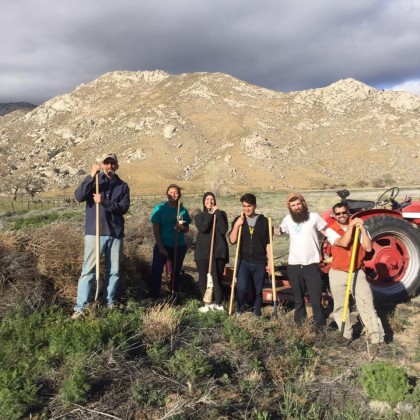
WildPlaces
2016 Anthony Prize Winner
Porterville-based WildPlaces serves disadvantaged communities at the intersection of California’s great Central Valley and majestic Southern Sierra. The organization’s small, diverse team of staff and volunteers draws from their own deep spiritual connections to our land, water, and air to help thousands of students and community members protect the region’s precious resources.
About Juliette Anthony
The Anthony Grassroots Prize was established in 1999 by environmental activist, Juliette Anthony. Ms. Anthony devoted most of her life to protecting natural habitats and promoting renewable energy – almost always as a volunteer helping to mobilize grassroots community power. She is recognized for helping to prohibit a development in the Santa Monica Mountains which successfully resulted in the acquisition of the 2000 acre Ahmanson Ranch in 2005, and the 440 acre Soka University property (the former Gillette Ranch) in early 2005 for permanent dedicated open space.
Her long and varied professional career included working as a Research Librarian at Harvard College Library, the New York Public Library on 42nd Street, the University of Virginia Library, and the UCLA Theatre Arts Library. She also served as Film & Music Librarian at the Beverly Hills and Santa Monica Libraries. But her true passion in life was the preservation of our fragile planet, and she was a politically active and passionate supporter of environmental causes and social justice. In addition to her long tenure on the Rose Foundation’s Advisory Board, over the course of her lifetime she maintained deep volunteer relationships with Heal the Bay, Coalition for Clean Air and Communities for a Better Environment, and numerous successful movements to preserve open space in California. She was a long-time renewable energy consultant and was an early advocate for solar power. In addition to her environmental work, she volunteered at the Venice Family Clinic, Lieu-Cap Shelter for Women and Children in Venice, CA and CLARE Foundation and most recently, for the REST program in San Rafael, CA.
Juliette’s commitment to the power of grassroots environmental stewardship led her to serve on the Rose Foundation’s pre-launch Advisory Board, helping catalyze the launch of the Rose Foundation in 1993. She endowed the Anthony Grassroots Prize in 1999 and for many years Juliette led the Prize’s annual review of nominations. Juliette passed away in 2022, and the Rose Foundation is proud to continue the Anthony Grassroots Prize as a living testament to Juliette’s activism: caring for other people and fighting for a more just, healthy and compassionate world.
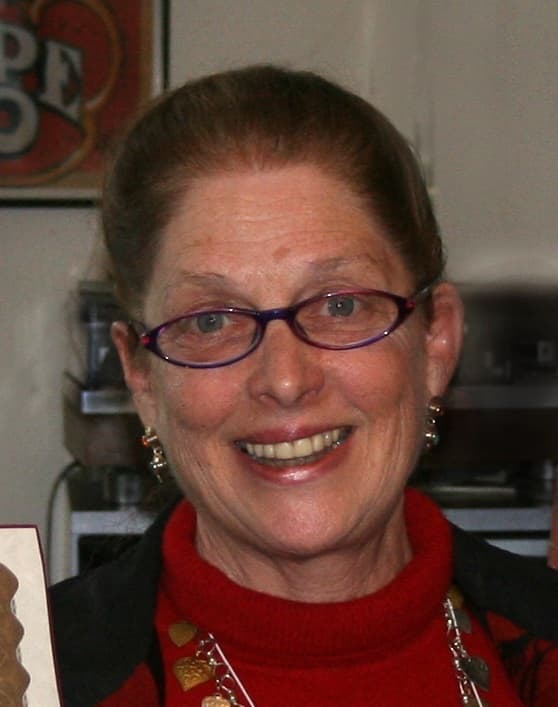
Stay Connected
Change is happening! Get feel good stories from our grantees, grant opportunities, and news delivered to your inbox.